九年级语法专题
初三(九年级)英语语法大全
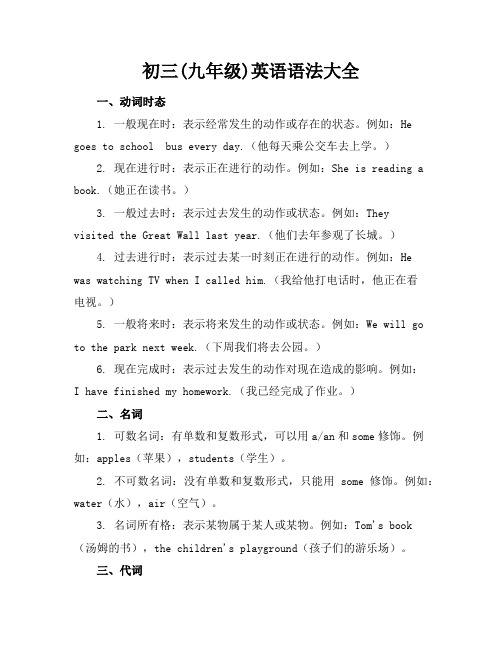
初三(九年级)英语语法大全一、动词时态1. 一般现在时:表示经常发生的动作或存在的状态。
例如:He goes to school bus every day.(他每天乘公交车去上学。
)2. 现在进行时:表示正在进行的动作。
例如:She is reading a book.(她正在读书。
)3. 一般过去时:表示过去发生的动作或状态。
例如:Theyvisited the Great Wall last year.(他们去年参观了长城。
)4. 过去进行时:表示过去某一时刻正在进行的动作。
例如:He was watching TV when I called him.(我给他打电话时,他正在看电视。
)5. 一般将来时:表示将来发生的动作或状态。
例如:We will go to the park next week.(下周我们将去公园。
)6. 现在完成时:表示过去发生的动作对现在造成的影响。
例如:I have finished my homework.(我已经完成了作业。
)二、名词1. 可数名词:有单数和复数形式,可以用a/an和some修饰。
例如:apples(苹果),students(学生)。
2. 不可数名词:没有单数和复数形式,只能用some修饰。
例如:water(水),air(空气)。
3. 名词所有格:表示某物属于某人或某物。
例如:Tom's book(汤姆的书),the children's playground(孩子们的游乐场)。
三、代词1. 人称代词:I(我),you(你/你们),he(他),she(她),it(它),we(我们),they(他们)。
2. 物主代词:my(我的),your(你的/你们的),his(他的),her(她的),its(它的),our(我们的),their(他们的)。
3. 指示代词:this(这个),that(那个),these(这些),those(那些)。
九年级英语语法专题练习-名词

九年级英语语法专题练习-名词语法练习-名词一、单项选择(共99小题;共99分)1. If you want to be a good football player like Messi, you need a lot of .A. practiceB. practicesC. playerD. play2. If trees are still cut down, there will be pollution in the future.A. too much; too manyB. too many; too muchC. too many; too manyD. too much; too much3. My cousins have collected stamps(邮票) for two years. They have stamps fromdifferent countries.A. fewB. manyC. muchD. little4. There are millions of websites(网站) on the Internet and there a lot of useful(有用的) on the websites.A. are; informationsB. are; informationC. is; informationD. is; informations5. Mrs. Smith is an old friend of .A. Ford motherB. Ford mother'sC. Ford's motherD. Ford's mother's6. --- Mum, I am hungry. May I have some ?--- Of course. But don't eat too much.A. breadB. noodleC. dumplingD. hamburger7. You will be all right if you drink water.A. a little ofB. plenty ofC. a bit ofD. a piece of8. It is sunny. What weather!A. a goodB. an awfulC. greatD. bad9. English is spoken by people.A. a lotB. much manyC. a large number ofD. a great deal of10. Mr. White has a beautiful garden with many in it.A. flowersB. grassC. villagesD. water11. mothers both work in the same hospital.A. Tim and Peter'sB. Tim's and PeterC. Tim's and Peter'sD. Tim and Peter12. A dog will love you faithfully and bring you happiness for years.A. lots ofB. manyC. a littleD. a few13. The job is a little difficult, we need quite a few workers to do it.A. lot ofB. a lots ofC. manyD. much14. I am going to the supermarket to buy some this afternoon.A. paper and pencilB. apples and bananaC. milk and eggsD. bowl and spoons15. How much do your parents pay for your each year?A. educationalB. educateC. educationD. educated16. mothers couldn't go to the meeting, because they havegone to Shanghai .A. Mary and Peter'sB. Mary and PeterC. Mary's and PeterD. Mary's and Peter's17. The teacher wants .A. three pieces of chalkB. three piece of chalkC. three pieces of chalksD. three piece of chalks18. No hurry! We still have time.A. a lotB. fewC. plenty ofD. many19. --- Good morning, madam. Can I help you?--- Sure, I'd like for cooking vegetables.A. two cups of coffeeB. three pieces of breadC. one bowl of dumplingsD. five kilos of oil20. There is news about this movie star in the newspaper. Where can I get some?A. manyB. a fewC. a lotD. little21. I want to buy .A. two bottles of milksB. two bottles of milkC. two bottle of milkD. two bottle milks22. --- How far is it from your home to your school?--- It's about .A. 2 kilometer longB. 2 kilometerC. five minutes' walkD. five minutes walk23. After practice, Langlang is a well-known pianist now.A. so many yearB. so many yearsC. so many year'sD. so many years'24. Do you know how many a horse has and how many a bee (蜜蜂) has?A. teeth; feetB. tooth; footC. tooth; feetD. teeth; foot25. I have three pen pals. One is , the other two are .A. Japanese; AmericaB. English; FrenchmenC. Canada; AustraliaD. Russian; Germany26. --- There are so many over there. What's happening?--- Let's go to have a look.A. flowerB. carC. childD. people27. --- Could you give me some on how to learn English well?--- Sure.A. suggestionsB. messagesC. informationsD. advices28. A classmate of was here ten minutes ago.A. youB. yourC. your sisterD. your sister's29. Mrs. Smith wants to buy .A. two bottles of milksB. two bottles of milkC. two bottle of milkD. two bottle of milks30. The student didn't find much about the topic on that website.A. reportB. articleC. informationD. story31.Several years ago, people knew Yao Ming. But now he is well-known all over the world,not only in China.A. fewB. littleC. manyD. most32. He found it impossible to finish work in an hour.A. so manyB. so muchC. much tooD. too many33. Students these days often have lots of .A. worryB. worrysC. worriesD. worried34. I like best of all the vegetables.A. potatoesB. tomatoC. breadsD. rice35. There are in the park.A. many attractionsB. much attractionC. a few attractionD. many fun36. This is bedroom, and that is her bedroom.A. Tina's; parents'sB. Tina; parents'C. Tina's; parents'D. Tina; parents's37. Tomorrow is . The students want to buy some flowers for their teacher.A. Teacher DayB. Teacher's DayC. Teachers' DayD. the Teachers Day38. Between two classes we have break.A. ten minutes'B. ten minute'sC. ten minuteD. ten minutes39. Don't worry. We have time to finish the job.A. manyB. plenty ofC. a lotD. lot of40. I want to buy a new bike. Can you give me ?A. some adviceB. some advicesC. an adviceD. some piece of advice41. The teacher advised us to read the four famous classical of Chinese literature.A. workB. worksC. jobD. jobs42. We have to buy the nice coat.A. money muchB. much moneyC. many moneyD. money many43. Tomorrow is the festival. It's May Day.A. workerB. worker'sC. workersD. workers'44. I'm so hungry. Please give me to eat.A. three breadB. three pieces of breadC. three piece of breadD. three breads45. They got much from those new books.A. ideasB. photosC. newsD. stories46. The baby panda can eat more than his mother.A. many timesB. many timeC. much timeD. much times47. I'd like two .A. bowl of noodleB. bowls of noodlesC. bowl of noodlesD. bowls of noodle48. I don't think doing housework is just work.A. womanB. woman'sC. women'sD. women49. --- When is birthday?--- His birthday is on October fifth.A. your brotherB. Jack sisterC. his sister'sD. Lucy's brother's50. --- I'd like grapes and pears.--- Oh, I only need orange juice.A. some; a fewB. a few; someC. a little; someD. a little; a few51. He needs two and some bread.A. piece turkeysB. pieces turkeysC. piece of turkeysD. pieces of turkey52. Five were lost in the spacecraft accident.A. lifeB. livesC. lifesD. lives53. Where is Mr. Zhang? I have to tell him.A. two newsB. two piece of newsC. two pieces of newsD. two pieces of new54. I'd like two .A. small bowl of noodlesB. small bowls of noodleC. small bowls of noodlesD. small bowl of noodle55. --- How many are there in your class? --- 40.A. a studentB. studentC. studentsD. student's56. Here is my family.A. a photo ofB. photo ofC. a photo atD. photo at57. The park is quite near here. It's only .A. ten minutes walkB. ten minute's walkC. ten minutes' walkD. ten minute's walks58. --- What can I do for you?--- I want to buy for my daughter.A. a clothingB. a piece clothingC. a piece of clothingD. the piece of clothing59. The online shop sells clothing at a very good price.A. child and man'sB. children and men'sC. children's and menD. children's and men's60. --- What is your sister like?--- She is very shy and doesn't have friends.A. a lotB. lot ofC. plentyD. plenty of61. --- With whom did you watch the 2010 World Cup Opening Ceremony?--- .A. A friend of mineB. A friend of meC. A friend of my sisterD. A friend of you62. --- What did you buy for your mother on Day?--- Nothing, I just made a card for her.A. WomanB. WomenC. Woman'sD. Women's63. This is desk. They sit together.A. Jim'sB. Tom'sC. Jim's and Tom'sD. Jim and Tom's64. --- What would you like?--- I'd like a glass of milk and .A. two slice of breadB. two slice of breadsC. two slices of breadD. two slices of breads65. should be allowed to play with their friends.A. Sixteen year oldsB. Sixteen-years oldC. Sixteen-year-oldsD. Sixteen-year-old66. The postcard is sent by .A. a friend of my fatherB. a friend of my father'sC. my father friendD. my father friend's67. These pictures are not mine. They're the .A. childrenB. chilrensC. children'sD. childrens'68. Look at these of .A. photos; potatosB. photoes; potatoesC. photoes; potatosD. photos; potatoes69. June 1 is .A. the Children's DayB. the Childrens' DayC. Children's DayD. Childrens' Day70. --- This is a photo of when they were young.--- OK, how happy they both looked!A. my father and motherB. my mother and father'sC. my mother's and father'sD. my father's and my mother71. --- Do you know the tall boy with sunglasses? --- Yes, he is Jack Green and he is one of my friends.A. a friend of mineB. a friend of meC. my friends' friendD. my best friends72. There are millions of websites on the Internet and therea lot of useful on thewebsites.A. are; informationsB. are; informationC. is; informationsD. is; information73. --- Where are you going?--- I'm going to a .A. clothing storeB. clothing's storeC. clothes' storeD. store clothes74. --- Are there any in the picture?--- Yes, there are.A. fishB. porkC. beef75. --- How many are there in your school?--- Twenty.A. woman teachersB. woman teacherC. women teacherD. women teachers76. Lily sees on the desk.A. five piece of woodB. five pieces of woodsC. five piece woodD. five pieces of wood77. It's said that more than 100 will attend this meeting in Shanghai.A. man teachersB. woman teachersC. men teachersD. womans teachers78. Swimming is in summer.A. a great funB. great funC. great funsD. great a fun79. --- Would you like some .--- Oh, yes, just a little.A. milkB. appleC. pearsD. oranges80. --- What's the date today?--- It's March 8th, Day.A. WomanB. WomenC. Woman'sD. Women's81. In old Chinese poems, each line has words.A. the number ofB. muchC. a littleD. a set number of82. watches are broken.A. Jim and Tom'sB. Jim's and T om'sC. Jim's and TomD. Jim and Tom83. All the in our school enjoyed themselves on March 8th because it was their own holidayA. men teacherB. women teachersC. woman teacher84. --- How many are there on the table?--- Only two.A. glasses of orangeB. glasses of orangesC. glass of orangeD. glass of oranges85. --- What's that?--- It's .A. a pencil of MaryB. a Mary's pencilC. a pencil of Mary'sD. Mary's a pencil86. Tom and Jim are brothers. They all Mr. Green's sons and daughters.A. Lucy's and LilyB. Lucy's and Lily'sC. Lucy's and LilyD. Lucy and Lily's87. John bought for himself yesterday.A. two pairs of shoesB. two pair of shoeC. two pair of shoesD. two pairs shoes88. The result of math test is good.A. the studentsB. the students'C. the student'sD. student's89. The shoes were very dirty, so I asked them to take them off before they wentinto house.A. boys'; John'sB. boys'; Johns'C. boy's; Johns'D. boy's; John's90. I think should not he allowed to drive.A. sixteen years oldB. sixteen-year-oldC. sixteen-year-olds91. These two bedrooms are .A. the twins'B. the twins'sC. of the twinD. of the twins92. The hospital is a bit far from here. It's about .A. forty minutes's walkB. forty minute's walkC. forty minutes walkD. forty minutes' walk93. We have many but little in the fridge.A. vegetables; meatB. pork; fruitC. chicken; milkD. fish; tomatoes94. --- Is it far from your home to school?--- Not very, only .A. 15 minute's rideB. 15 minutes' rideC. 15 minutes rideD. 15 minutes' rides95. --- How far is it from your home to the post office?--- It's about .A. 10 minutes rideB. 10 minute's rideC. 10 minutes' rideD. 10minutes ride96. The little boy wants to buy .A. two piece of woodB. two pieces of woodC. two woodsD. two pieces of woods97. How many do we have?A. bottle of orangeB. bottles of orangeC. bottles of orangesD. bottle of orange98. Supermarkets are necessary. People usually spend time finding things they want, butthey usually spend money than they want.A. less; lessB. less; moreC. fewer; lessD. fewer; more99. I live near the station, It's only about five walk.A. minute'sB. minuteC. minutes'D. minutes答案一、单项选择1. A2. B3. B4. C5. D6. A7. B8. C9. C 10. A11. C 12. A 13. C 14. C 15. C16. D 17. A 18. C 19. D 20. D21. B 22. C 23. D 24. A 25. B26. D 27. A 28. D 29. B 30. C31. A 32. B 33. C 34. A 35. A36. C 37. C 38. A 39. B 40. A41. B 42. B 43. D 44. B 45. C46. A 47. B 48. C 49. D 50. B51. D 52. B 53. C 54. C 55. C56. A 57. C 58. C 59. D 60. D61. A 62. D 63. D 64. C 65. C66. B 67. C 68. D 69. C 70. B 71. A 72. D 73. A 74. A 75. D 76.D 77. C 78. B 79. A 80. D 81. D 82. B 83. B 84. A 85. C 86. D 87. A88. B 89. A 90. C 91. A 92. D 93. A 94. B 95. C 96. B 97. B 98. B 99. C。
英语人教版九年级全册Unit3 语法专项--宾语从句

可以告诉我怎么了吗?
3. 下列宾语丛句的语序是否正确。 1. I think that he will come to China next year. T 2. I want to know if he was at home yesterday. T 3. Can you tell me where does your mother work?F
宾语从句(The object clause)
定义:复合句中,放在动词或 介词后充当宾语的句子叫宾 语从句。
宾语从句学习要点:
一、引导词
三
二、语序
要
三 、时态
素
四、否定转移
五、宾语从句与简单句的转换
一.宾语从句的引导词
宾语从句根据引导词的不同可分为三种类型:
引导词
(看从句)
that
从句是陈述句 (口语中常省略)
是疑问语气,用 if/whether; 是肯定语气,用that.
1.填写合适的引导词
1 Can you tell me__C____you were born, Betty?
A. who B. what C. when D. that
2 I don't know _B__ they have passed the exam.
He asked whose handwriting was the best.
Can you tell me where the No.3 bus stop is?
I don’t know why the train is late.
人教版九年级英语语法专题训练(Word版含答案)
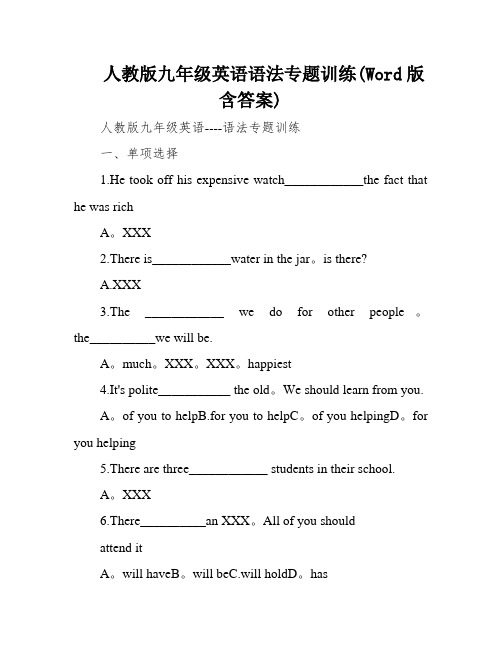
人教版九年级英语语法专题训练(Word版含答案)人教版九年级英语----语法专题训练一、单项选择1.He took off his expensive watch____________the fact that he was richA。
XXX2.There is____________water in the jar。
is there?A.XXX3.The ____________ we do for other people。
the__________we will be.A。
much。
XXX。
XXX。
happiest4.It's polite___________ the old。
We should learn from you.A。
of you to helpB.for you to helpC。
of you helpingD。
for you helping5.There are three____________ students in their school.A。
XXX6.There__________an XXX。
All of you shouldattend itA。
will haveB。
will beC.will holdD。
has7.____________will you come back from you work。
Dad?In about half an hour。
dear.A。
XXX8.The government is setting up nature parks___________ protect pandas.A。
XXX9.We had fun___________ the robots do many different kinds of things.A。
XXX10.-Does the old man have to____________his wife?Yes。
九年级英语语法知识点汇总
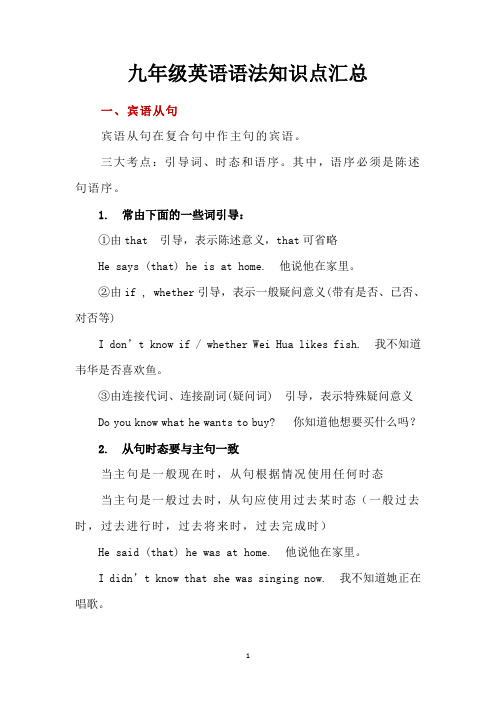
九年级英语语法知识点汇总一、宾语从句宾语从句在复合句中作主句的宾语。
三大考点:引导词、时态和语序。
其中,语序必须是陈述句语序。
1. 常由下面的一些词引导:①由that 引导,表示陈述意义,that可省略He says (that) he is at home. 他说他在家里。
②由if , whether引导,表示一般疑问意义(带有是否、已否、对否等)I don’t know if / whether Wei Hua likes fish. 我不知道韦华是否喜欢鱼。
③由连接代词、连接副词(疑问词) 引导,表示特殊疑问意义Do you know what he wants to buy? 你知道他想要买什么吗?2. 从句时态要与主句一致当主句是一般现在时,从句根据情况使用任何时态当主句是一般过去时,从句应使用过去某时态(一般过去时,过去进行时,过去将来时,过去完成时)He said (that) he was at home. 他说他在家里。
I didn’t know that she was singing now. 我不知道她正在唱歌。
She wanted to know if I had finished m homework. 她想要知道我是否已经完成了我的作业。
Did you know when he would be back? 你知道他什么时候会回来吗?二、感叹句感叹句是表达喜、怒、哀、乐以及惊奇、惊讶等强烈感情的句子。
感叹句通常由what 或how 引导。
现分述如下:1. 由what 引导的感叹句,其句子结构可分为以下三种:①可用句型:“ What +a / an+形容词+可数名词单数+主语+谓语+其他!”。
如:What a nice present it is! 它是一件多么好的礼物啊!②可用句型:“ What+形容词+可数名词复数+主语+谓语+其他!”。
如:What beautiful flowers they are! 多么漂亮的花啊!③可用句型:“ What +形容词+不可数名词+主语+谓语+其他!”。
九年级英语语法专项复习7-直接引语和间接引语

单击添加标题
Method of converting direct speech to indirect speech
Change the tense of the verb to agree with the reporting verb Use "that" to introduce the reported speech less it is committed Change the person and number of the subject and verb as necessary The method of transforming declarative intentions
Principle of Transformation
To change direct speech into indirect speech, you need to make changes to the tense, pronouns, and some of the word order The reporting verb (said, held, etc.) retains Direct speech and indirect speech are two ways of reporting what someone has said Direct speech uses the exact words of the speaker, while indirect speech reports the meaning of what was said
英语九年级全一册语法.doc
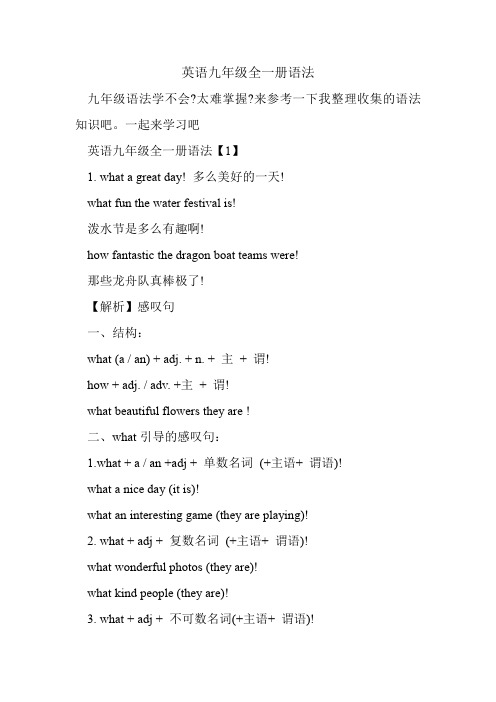
英语九年级全一册语法九年级语法学不会?太难掌握?来参考一下我整理收集的语法知识吧。
一起来学习吧英语九年级全一册语法【1】1. what a great day! 多么美好的一天!what fun the water festival is!泼水节是多么有趣啊!how fantastic the dragon boat teams were!那些龙舟队真棒极了!【解析】感叹句一、结构:what (a / an) + adj. + n. + 主+ 谓!how + adj. / adv. +主+ 谓!what beautiful flowers they are !二、what引导的感叹句:1.what + a / an +adj + 单数名词(+主语+ 谓语)!what a nice day (it is)!what an interesting game (they are playing)!2. what + adj + 复数名词(+主语+ 谓语)!what wonderful photos (they are)!what kind people (they are)!3. what + adj + 不可数名词(+主语+ 谓语)!_______ bad weather (it is)!what nice food (he cooks)!三、how引导的感叹句:1.how + adj / adv + 主语+ 谓语!how nice he is!how beautiful the flowers are!2.how + adj + a / an + 单数名词(+主语+ 谓语)!how tall a boy (he is )!how nice a song (she is singing)!3.how + adj / adv + the + 名词+ 谓语!how tall the boy is!how fine the day is!4、what 与how引导的感叹句之间的转换:1.what a beautiful girl she is != ______ beautiful the girl is !2.how delicious the food is != ______ delicious food it is !2.the dragon boat festival in hong kong 香港龙舟节【解析】介词in表地点in用于较大的地点前,如大城市、国家、洲等。
九年级英语十大必考语法点(适用各个版本)

九年级英语十大必考语法点(适用各个版本)一. 宾语从句1. 宾语从句的含义在整个句子中做宾语的从句叫做宾语从句。
如:She knew that the teacher had seen the film.她知道这位老师看过这部电影。
(“that the teacher had seen the film”做knew 的宾语,同时又是由连接词that 引导的从句,所以它叫做宾语从句。
)2. 宾语从句的分类(1)动词宾语从句:顾名思义,它是位于动词后面的宾语从句。
例如:He asked whose handwriting was the best in our class.他问我们班上谁的书法最好。
(2)介词宾语从句:顾名思义,它是位于介词后面的宾语从句。
例如:I agree with what you said just now.我同意你刚才说的话。
(3)形容词宾语从句:顾名思义,它是位于形容词后面的宾语从句。
例如:I am afraid that I will be late. 恐怕我要迟到了。
3. 引导名词性从句的连接词(1)that:没有含义,在宾语从句中不做成分(2)whether/if:表示是否,在宾语从句中不做成分。
I don't know if /whether he still lives here after so many years. 我不知道这么多年后,他是否还住在这里。
(3)连接代词:what, which, who, whom, whose(在宾语从句中做主、宾、表和定语)连接副词:where, when, how, why(在宾语从句中做状语)The small children don't know what is in their stockings.(what 在宾语从句中做主语)这些小孩子不知道什么在他们的长筒袜里。
Could you tell me why you were late for the meeting this morning?(why 在宾语从句中做原因状语)你能告诉我为什么你今天早上开会迟到吗?4. 在做宾语从句的题目时应注意两点(1)时态①当主句是现在时态时,宾语从句可以根据需要使用任何时态。
[必刷题]2024九年级英语上册语法填空专项专题训练(含答案)
![[必刷题]2024九年级英语上册语法填空专项专题训练(含答案)](https://img.taocdn.com/s3/m/31e4e5a5aff8941ea76e58fafab069dc5122476f.png)
[必刷题]2024九年级英语上册语法填空专项专题训练(含答案)试题部分一、选择题:1. Choose the correct form of the verb to plete the sentence. "He _______ to the library every weekend to read books."A. goB. goesC. goingD. gone2. Identify the correct tense to plete the sentence. "By next month, she _______ for the pany for three years."A. will workB. has workedC. workedD. is working3. Select the appropriate preposition to plete the sentence. "He is responsible _______ the project."A. forB. toC. in4. Choose the correct form of the adjective to plete the sentence. "She is _______ than her sister."A. beautifullerB. more beautifulC. beautifullestD. beauty5. Which sentence uses the correct parative form of the adjective? "He is _______ tall than his brother."A. tallerB. tallC. tallestD. tallerly6. Fill in the blank with the correct form of the pronoun. "_________ is going to the movies tonight."A. SheB. HeC. ItD. They7. Choose the correct conjunction to plete the sentence. "She loves singing, _______ she doesn't like dancing."A. andB. butC. or8. Identify the correct past participle form of the verb. "The book was _______ the famous author."A. writeB. wroteC. writtenD. writed9. Select the correct article to plete the sentence. "I saw _______ interesting movie last night."A. aB. anC. theD. no10. Fill in the blank with the correct form of the verb. "If I _______ you, I would study harder for the exam."A. amB. wereC. beD. have been二、判断题:1. The sentence "She has been to Beijing twice" is in the present perfect tense. ( )2. The phrase "look forward to" is followed a gerund. ( )3. "Whose" is a possessive pronoun. ( )4. The sentence "I like apples, but she likes bananas" uses a correct contrast. ( )5. "Than" is a subordinating conjunction. ( )三、填空题:1. The past tense of the verb "do" is _______.2. The plural form of "child" is _______.3. The present perfect continuous tense of "play" is_______.4. "I have _______ a letter from my pen pal." (Use the correct past participle form of "send".)5. The correct form of "there is" in the plural is_______.6. The opposite of "expensive" is _______.7. "I _______ (be) to London last year." (Fill in the correct verb form.)8. "The sun _______ (rise) in the east." (Fill in the correct verb form.)9. "She _______ (go) to the store and _______ (buy) some milk." (Fill in the correct verb forms.)10. "If it _______ (rain) tomorrow, we will stay at home." (Fill in the correct verb form.)11. "The cat _______ (be) on the table." (Fill in the correct form of "be".)12. "He _______ (read) a book when I called him." (Fill in the correct past continuous form of "read".)13. "They _______ (not go) to the party because they_______ (be) tired." (Fill in the correct verb forms.)14. "She _______ (can) speak three languages fluently." (Fill in the correct modal verb.)15. "_______ you like some coffee?" (Fill in the correct form of "do".)16. "He _______ (should) have finished his homework now." (Fill in the correct modal verb form.)17. "The movie _______ (be) very interesting." (Fill in the correct form of "be".)18. "We _______ (be) happy to help you." (Fill in the correct form of "be".)19. "They _______ (be) going to the zoo next week." (Fill in the correct form of "be".)20. "I wish I _______ (can) fly." (Fill in the correct modal verb form.)四、简答题:1. What is the difference between "affect" and "effect"?2. Explain the difference between "its" and "it's".3. What is the past perfect tense and give an example sentence.4. What is a gerund and how is it used in a sentence?5. How do you form the present continuous tense?6. What is a modal verb? Give three examples.7. What is the difference between "some" and "any"?8. Explain the use of "used to" in a sentence.9. How do you form questions in the present simple tense?10. What is the difference between "there", "their", and "they're"?本套试题答案如下一、选择题:1. B2. B3. A4. B5. A6. A7. B8. C9. A10. B二、判断题:1. √2. √3. ×4. √5. ×三、填空题:1. did2. children3. has been playing4. received5. there are6. cheap7. was8. rises9. went, bought10. rains11. is12. was reading13. didn't go, were14. can15. Would16. should17. is18. are19. are20. could四、简答题:1. "Affect" is a verb, "effect" is a noun.2. "Its" is a possessive adjective, "it's" is a contraction of "it is".3. The past perfect tense is used to describe an action that was pleted before another past action. Example: "By the time he arrived, the meeting had already started."4. A gerund is a verb form ending in ing that functionsas a noun. Example: "Reading is my favorite hob."5. The present continuous tense is formed with thepresent tense of "be" followed the ing form of the verb. Example: "She is singing."6. Modal verbs are auxiliary verbs that express possibility, permission, or ability. Examples: can, may, must.7. "Some" is used in positive sentences, "any" is used in negative sentences and questions.8. "Used to" is used to describe a past habit or state that is no longer true. Example: "He used to smoke, but he quit."9. To form questions in the present simple tense, invert the subject and the verb "do" or "does". Example: "Do youlike coffee?"10. "There" indicates a place, "their" is a possessive adjective, "they're" is a contraction of "they are".。
九年级英语全册Unit6单元语法专题SectionAGrammarFocus_4c人教版
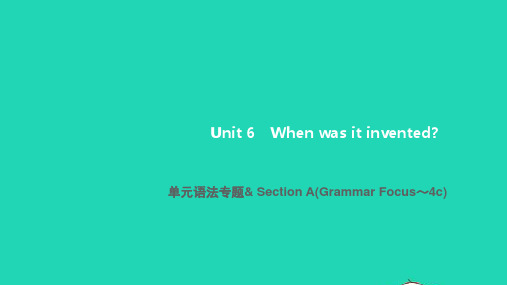
Monday.
A. accepts B. accepted C. was accepted D. is accepted
(C )2. (2018·重庆)—Who's the little girl in the photo, Laura?
—It's me. This photo______when I was five.
Unit 6 When was it invented?
单元语法专题& Section A(Grammar Focus~4c)
语法知识专讲
被动语态(二) 一、一般过去时的被动语态 在第五单元已介绍了被动语态的概念及主动语态变被动语态的用法,本单 元主要介绍一般过去时的被动语态。一般过去时的被动语态的结构: 1. 肯定句:主语+was/were+Vp. p(+by…).
A. is taken B. takes
C. was taken
D. took
C( )3. (2019·百色改编)As we know,printing ______ during the Sui and Tang
Dynasties in China.
A. invented
B. is invented
e. g. :—Was he invited to the party?他被邀请去参加晚会了吗? —Yes, he was. 是的。
4. 特殊疑问句:特殊疑问词(When/Where/Who/…)+was/were+主语+Vp. p(+ by…)?
e. g. :Where was the car parked?那辆车停在什么地方?
by ordinary people by accident.
英语人教PEP版九年级(上册)+Unit5+语法专题讲解(2024版新教材)

THANK YOU
4. The paper is made from wood.(对划线部分提问) _W__h_a_t__ __is____ the paperm__a_d_e___ from?
选择题
1. Around the world, millions of waste _____A_ every day. A. is created B. was created C. creates
九年级全一册Unit 5语法专题 一般现在时的被动语态
目录
content
认识被动语态 一般现在时被动语态的用法
巩固练习
认识被动语态
语态
语态
主动语态 被动语态
主语是动作的执行者
Mike picks up the dictionary.
主语是动作的承受者
The dictionary is picked up by Mike.
2. The bottle ___C___ with water. Drink some, please. A. fill B. filled C. is filled
3. The clay pieces ____A___ at a very high heat. A. are fired B. is fired C. fired
一般现在时被动语态的特殊疑问句
1.对原材料进行提问用:what What is the sweater made of? 2.对地点提问用:where Where is the sweater made? 3.对方式进行提问用:how How is the sweater made?
巩固练习根据中文意思完成ຫໍສະໝຸດ 子用所给单词的适当形式填空
人教版九年级英语 Unit 10 单元语法小专题

单元语法小专题(Grammar Focus)语法精讲suppose的用法总结suppose作为动词,其意思是“猜想,设想,认为,假设”,其常见用法为:1. be supposed to do sth.意思是“被期望做某事;应该做某事”,to是不定式符号,不是介词,后接动词原形。
be supposed to常用来表示劝告、建议、告知义务或责任等,相当于should。
如:He is supposed to arrive on time.他应该准时到达。
You are supposed to ask the teacher if you want to leave the classroom.如果你要离开教室,你应该问问老师。
You are supposed to shake hands.你应该去握手。
2. 在口语中,常用否定结构“be not supposed to do sth.”,意思是“不允许做某事;不应该做某事”,相当于shouldn't。
如:You are not supposed to smoke on the bus.(=You shouldn't smoke on the bus.)你不应该在公共汽车上吸烟。
We are not supposed to play football in the street.我们不应该在大街上踢足球。
3. be supposed to have done sth.意为“本应该做某事而没有做”。
如:You are supposed to have handed in your homework.你本应该已经交了作业。
4. supposed+that从句,当变为否定句时,否定词应该前移。
类似的词还有think,believe 等。
如:I don't suppose he will tell you about it.我认为他不会告诉你这件事。
九年级英语语法知识点汇总
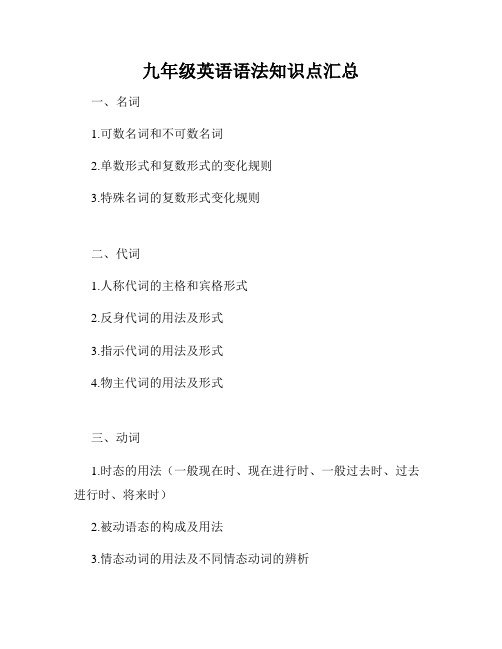
九年级英语语法知识点汇总
一、名词
1.可数名词和不可数名词
2.单数形式和复数形式的变化规则
3.特殊名词的复数形式变化规则
二、代词
1.人称代词的主格和宾格形式
2.反身代词的用法及形式
3.指示代词的用法及形式
4.物主代词的用法及形式
三、动词
1.时态的用法(一般现在时、现在进行时、一般过去时、过去进行时、将来时)
2.被动语态的构成及用法
3.情态动词的用法及不同情态动词的辨析
四、形容词和副词
1.形容词的基本用法及比较级和最高级的构成
2.副词的基本用法及比较级和最高级的构成
3.形容词和副词的位置
五、介词和介词短语
1.常用介词的用法及常见短语的搭配
2.介词短语的位置和作用
六、连词和并列句
1.连词的分类和用法(并列连词、从属连词、对等连词)
2.并列句的构成及注意事项
七、从句和复合句
1.名词性从句的种类和用法(主语从句、宾语从句、表语从句)
2.定语从句的构成及引导词的使用
3.状语从句的分类及引导词的使用
八、倒装句和间接引语
1.完全倒装句和部分倒装句的构成及使用场景
2.直接引语和间接引语的转换
九、复习与补充
1.重点复习前面九个年级所学的语法知识点
2.补充其他有关九年级英语语法的知识
以上是九年级英语语法知识点的汇总,希望能帮助到你对这些知识点的理解和掌握。
在学习过程中,请多做练习和总结,以提高自己的语法能力。
祝你学习顺利!。
九年级英语语法知识点全总结
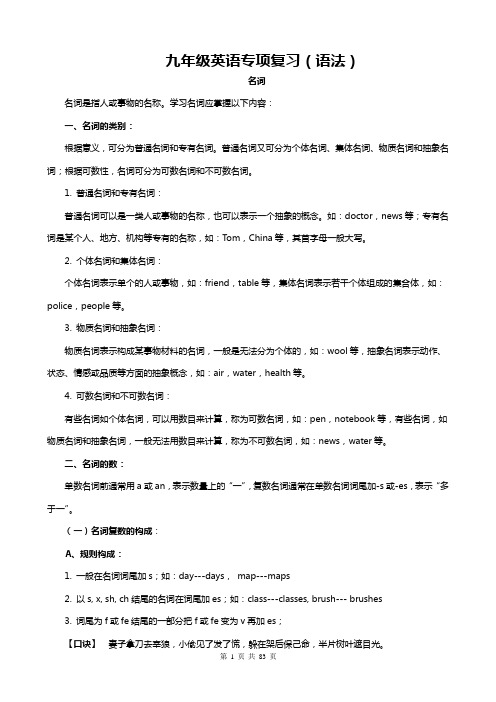
九年级英语专项复习(语法)名词名词是指人或事物的名称。
学习名词应掌握以下内容:一、名词的类别:根据意义,可分为普通名词和专有名词。
普通名词又可分为个体名词、集体名词、物质名词和抽象名词;根据可数性,名词可分为可数名词和不可数名词。
1. 普通名词和专有名词:普通名词可以是一类人或事物的名称,也可以表示一个抽象的概念。
如:doctor,news等;专有名词是某个人、地方、机构等专有的名称,如:Tom,China等,其首字母一般大写。
2. 个体名词和集体名词:个体名词表示单个的人或事物,如:friend,table等,集体名词表示若干个体组成的集合体,如:police,people等。
3. 物质名词和抽象名词:物质名词表示构成某事物材料的名词,一般是无法分为个体的,如:wool等,抽象名词表示动作、状态、情感或品质等方面的抽象概念,如:air,water,health等。
4. 可数名词和不可数名词:有些名词如个体名词,可以用数目来计算,称为可数名词,如:pen,notebook等,有些名词,如物质名词和抽象名词,一般无法用数目来计算,称为不可数名词,如:news,water等。
二、名词的数:单数名词前通常用a或an,表示数量上的“一”,复数名词通常在单数名词词尾加-s或-es,表示“多于一”。
(一)名词复数的构成:A、规则构成:1. 一般在名词词尾加s;如:day---days,map---maps2. 以s, x, sh, ch结尾的名词在词尾加es;如:class---classes, brush--- brushes3. 词尾为f或fe结尾的一部分把f或fe变为v再加es;【口诀】妻子拿刀去宰狼,小偷见了发了慌,躲在架后保己命,半片树叶遮目光。
wife ---wives, knife---knives, wolf---wolves, thief ---thieves, shelf---shelves, self—selves, life ---lives, half---halves, leaf---leaves还有一部分以f或fe结尾的直接加s;如:roof---roofs,chief—chiefs* scarf---scarfs / scarves4. 词尾为辅音字母+y结尾的,要先把y变成i再加es;如:country---countries,factory---factories,family---families5.词尾为o的一部分加s,一部分加es;如:(1)加-es:两人两菜一水果(*Negro---Negroes,hero---heroes,tomato—tomatoes,potato---potatoes,mango---mangoes)(2 )加-s工作间里有架钢琴,钢琴上有台收音机,收音机旁有幅照片,照片里有动物园,动物园里有竹子。
九年级全册英语语法知识大汇总
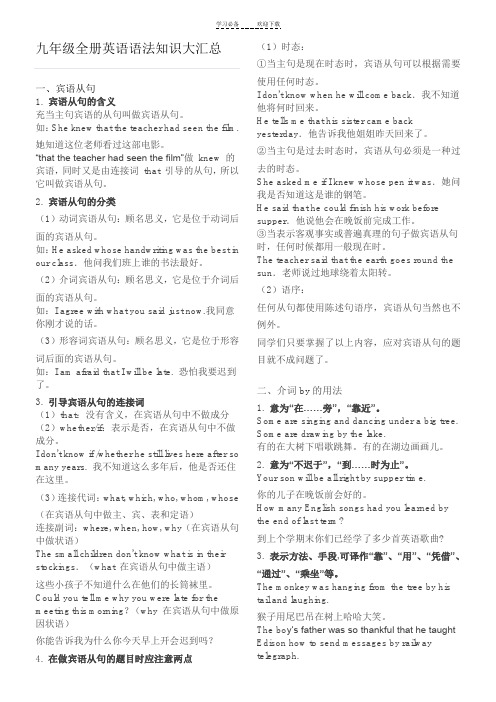
一、宾语从句1. 宾语从句的含义充当主句宾语的从句叫做宾语从句。
如:She knew that the teacher had seen the film.她知道这位老师看过这部电影。
“that the teacher had seen the film”做knew 的宾语,同时又是由连接词that 引导的从句,所以它叫做宾语从句。
2. 宾语从句的分类(1)动词宾语从句:顾名思义,它是位于动词后面的宾语从句。
如:He asked whose handwriting was the best in our class.他问我们班上谁的书法最好。
(2)介词宾语从句:顾名思义,它是位于介词后面的宾语从句。
如:I agree with what you said just now.我同意你刚才说的话。
(3)形容词宾语从句:顾名思义,它是位于形容词后面的宾语从句。
如:I am afraid that I will be late. 恐怕我要迟到了。
3. 引导宾语从句的连接词(1)that:没有含义,在宾语从句中不做成分(2)whether/if:表示是否,在宾语从句中不做成分。
I don't know if /whether he still lives here after so many years. 我不知道这么多年后,他是否还住在这里。
(3)连接代词:what, which, who, whom, whose(在宾语从句中做主、宾、表和定语)连接副词:where, when, how, why(在宾语从句中做状语)The small children don't know what is in their stockings.(what 在宾语从句中做主语)这些小孩子不知道什么在他们的长筒袜里。
Could you tell me why you were late for the meeting this morning?(why 在宾语从句中做原因状语)你能告诉我为什么你今天早上开会迟到吗?4. 在做宾语从句的题目时应注意两点(1)时态:①当主句是现在时态时,宾语从句可以根据需要使用任何时态。
2024-2025学年人教版九年级英语上册单元语法小专题[8]-课件
![2024-2025学年人教版九年级英语上册单元语法小专题[8]-课件](https://img.taocdn.com/s3/m/d2cfe7867e192279168884868762caaedc33ba65.png)
Ⅱ.根据汉语提示完成下列句子,每空一词。 6. He __u_s_e_d___ _to_______be________(以前是) a history teacher in our school. 7. There __u_se_d____ _to______b_e________(以前有) an old temple near the village. 8. She _g_e_t_s____u_s_e_d____t_o____w_a_l_ki_ng________(习惯于散 步) after supper. 9. Wood __Is______us_e_d____t_o_ ____m_a_k_e_ ________(被用来 制造)paper. 10. Mrs. Black _H_a_s_____be_e_n_/g_o_t___u_se_d_____to_ ________( 已习惯于)eating with chopsticks.
Ⅲ.按要求完成下列句子,每空一词。 11. My brother used to play football after school.(改为一 般疑问句并作否定回答) —___D__id___ your brother __U_s_e____ _t_o______p_la_y______ football after school? —No,he __d__id_n_'_t_. 12. Tom used to be a quiet boy.(改为否定句) Tom __d_id_n__'t__ _u_s_e_____ t_o______b_e ________ a quiet boy. 13. There used to be an old hospital behind our school, __d_i_d_n_‘_t _ t_h_e_r_e____?(完成反意疑问句) 14. I used to see my aunt once a month.(对画线部分提问) __H_o_w____ _o_ft_e_n____d_id_______ you ___U__s_e__ _t_o______ see your aunt? 15. Mary used to stand at the window and wave goodbye.(改为一般疑问句) ___D_id____ Mary _____u_s_e_ __t_o_____ stand at the window and wave goodbye?
九年级上册英语语法总结【八篇】
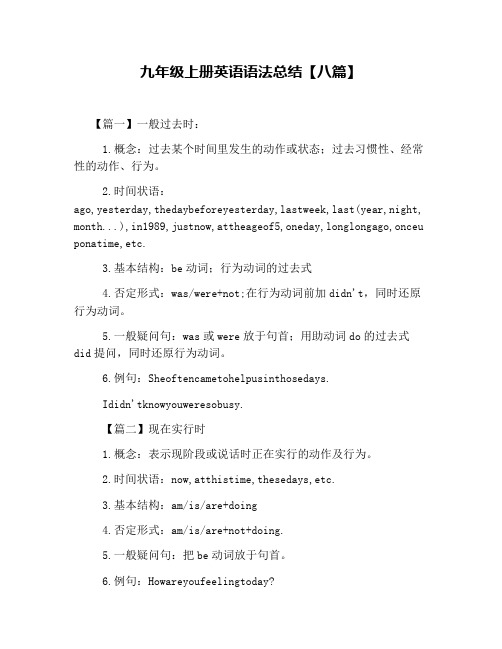
九年级上册英语语法总结【八篇】【篇一】一般过去时:1.概念:过去某个时间里发生的动作或状态;过去习惯性、经常性的动作、行为。
2.时间状语:ago,yesterday,thedaybeforeyesterday,lastweek,last(year,night, month...),in1989,justnow,attheageof5,oneday,longlongago,onceu ponatime,etc.3.基本结构:be动词;行为动词的过去式4.否定形式:was/were+not;在行为动词前加didn't,同时还原行为动词。
5.一般疑问句:was或were放于句首;用助动词do的过去式did提问,同时还原行为动词。
6.例句:Sheoftencametohelpusinthosedays.Ididn'tknowyouweresobusy.【篇二】现在实行时1.概念:表示现阶段或说话时正在实行的动作及行为。
2.时间状语:now,atthistime,thesedays,etc.3.基本结构:am/is/are+doing4.否定形式:am/is/are+not+doing.5.一般疑问句:把be动词放于句首。
6.例句:Howareyoufeelingtoday?Heisdoingwellinhislessons.【篇三】过去实行时:1.概念:表示过去某段时间或某一时刻正在发生或实行的行为或动作。
2.时间状语:atthistimeyesterday,atthattime或以when引导的谓语动词是一般过去时的时间状语等。
3.基本结构:was/were+doing4.否定形式:was/were+not+doing.5.一般疑问句:把was或were放于句首。
6.例句:AtthattimeshewasworkinginaPLAunit.Whenhecamein,Iwasreadinganewspaper.【篇四】现在完成时:1.概念:过去发生或已经完成的动作对现在造成的影响或结果,或从过去已经开始,持续到现在的动作或状态。
初三的英语语法知识点

初三的英语语法知识点初三是初中英语学习的关键阶段,语法知识的掌握对于提升英语综合能力至关重要。
以下是初三英语中一些重要的语法知识点。
一、时态1、现在完成时现在完成时表示过去发生的动作对现在造成的影响或结果,或者从过去开始一直持续到现在的动作或状态。
其构成是“have/has +过去分词”。
例如:“I have seen this film before”(我以前看过这部电影。
)“He has lived here for ten years”(他在这里住了十年了。
)2、过去完成时过去完成时表示过去某个时间或动作之前已经发生或完成的动作,即“过去的过去”。
它的构成是“had +过去分词”。
比如:“By the time I got to the station, the train had left”(我到车站的时候,火车已经开走了。
)3、过去将来时过去将来时表示从过去的某一时间来看将来要发生的动作或存在的状态。
其构成是“would +动词原形”或者“was/were going to +动词原形”。
例如:“She said she would come to see me the next day”(她说她第二天会来看我。
)二、被动语态被动语态在初三英语中也是一个重点。
一般现在时的被动语态是“am/is/are +过去分词”,一般过去时的被动语态是“was/were +过去分词”,一般将来时的被动语态是“will be +过去分词”或“be going to be+过去分词”,现在完成时的被动语态是“have/has been +过去分词”。
例如:“This book is read by many people”(这本书被很多人读。
)“The bridg e was built last year”(这座桥是去年建的。
)三、宾语从句宾语从句在句子中作宾语,通常由 that(可省略)、if/whether(是否)、连接代词(what, who, whom, whose, which)、连接副词(when, where, why, how)引导。
九年级上册英语语法总结【八篇】

九年级上册英语语法总结【八篇】【篇一】一般过去时:1.概念:过去某个时间里发生的动作或状态;过去习惯性、经常性的动作、行为。
2.时间状语:ago,yesterday,thedaybeforeyesterday,lastweek,last(year,night,month... ),in1989,justnow,attheageof5,oneday,longlongago,onceuponatime,etc.3.根本结构:be动词;行为动词的过去式4.否认形式:was/were+not;在行为动词前加didn’t,同时复原行为动词。
5.一般疑问句:was或were放于句首;用助动词do的过去式did提问,同时复原行为动词。
6.例句:Sheoftencametohelpusinthosedays.Ididn’tknowyouweresobusy.【篇二】现在进行时:1.概念:表示现阶段或说话时正在进行的动作及行为。
2.时间状语:now,atthistime,thesedays,etc.:am/is/are+doing4.否认形式:am/is/are+not+doing.5.一般疑问句:把be动词放于句首。
6.例句:Howareyoufeelingtoday?Heisdoingwellinhislessons.【篇三】过去进行时:1.概念:表示过去某段时间或某一时刻正在发生或进行的行为或动作。
2.时间状语:atthistimeyesterday,atthattime或以when引导的谓语动词是一般过去时的时间状语等。
3.根本结构:was/were+doing4.否认形式:was/were+not+doing.5.一般疑问句:把was或were放于句首。
6.例句:AtthattimeshewasworkinginaPLAunit.Whenhecamein,Iwasreadinganewspaper.【篇四】现在完成时:1.概念:过去发生或已经完成的动作对现在造成的影响或结果,或从过去已经开始,持续到现在的动作或状态。
- 1、下载文档前请自行甄别文档内容的完整性,平台不提供额外的编辑、内容补充、找答案等附加服务。
- 2、"仅部分预览"的文档,不可在线预览部分如存在完整性等问题,可反馈申请退款(可完整预览的文档不适用该条件!)。
- 3、如文档侵犯您的权益,请联系客服反馈,我们会尽快为您处理(人工客服工作时间:9:00-18:30)。
九年级语法专题:复句定义:由两个或两个以上的单句组成的句子称为复句,组成复句的单句叫做分句。
分句可以是主谓句,也可以是非主谓句。
分句之间都有短暂的语音停顿,书面上用逗号或分号表示。
复句的分句间有一定的逻辑事理关系,根据分句间不同的逻辑事理关系,可以把复句分为并列、递进、选择、转折、因果、假设、条件等类型。
复句的类型:(一)并列复句:由两个或两个以上的分句并列组成,这些分句叙述相关的几件事情,或说明相关的几种情况,它们之间没有主次之分。
并列复句常由分句直接组合而成。
例如:1.虚心使人进步,骄傲使人落后。
并列复句有时借助关联词语组合,常用的有“也”“又”“还”“既,又”“一边,一边”“一方面,一方面”“不是,而是”等。
例如:1.人民感谢我们,资产阶级也会出来捧场。
2.一会儿翅膀碰着波浪,一会儿箭一般地直冲向乌云。
(二)递进关系、选择关系。
递进复句:有两个有递进关系的分句组成,后一个分句表示的意思比前一个分句进一层,分句间常用的关联词语有“更”“甚至”“特别”“何况”“不但(不仅、不止、不光)……,而且……(并且、也、还、甚至)……”“尚且……,何况……”等。
例如:1、我们既不应当因为出了点错误便偃旗息鼓,悲观泄气,更不应当有了错误就否定改革。
2、我们不但善于破坏一个旧世界,我们还将善于建设一个新世界。
3、怀疑不仅是从消极方面辨伪去妄的必要步骤,也是从积极方面建设新学说、启迪新发明的基本条件。
4、你上课时不能说话,尤其是在老师讲课时。
5、你连自己都说服不了,何况别人呢?选择复句由两个或两个以上有选择关系的分句组成。
选择复句有两种。
一种是有取舍的选择复句,表示对两种可能的情况有所取舍,常用“与其……,不如……”“宁可……也不……”等关联词语。
例如:文天祥宁可站着死,也不跪着生。
与其现在后悔,不如当初好好去学。
另一种是无取舍的选择复句,只提出几种可能的情况,常用“或者……”“也许……,也许……”等关联词语,表示两种可能性是相容的。
并不互相排斥;也常用“不是……,就是……”“要么……,要么……”等关联词语,表示两种可能性是不相容的,不能同时存在。
例如:要么我们被困难吓倒,要么我们把困难搬掉。
(三)转折复句转折复句:由两个有转折关系的分句组成。
后一个分句的意思不是顺着前一个分句的意思说下来,而是转到相反的意思上去。
这类复句常用“虽然(尽管。
固然),但是(可是。
却)”“然而”不过“等关联词。
例如:1. 有的青年虽有理想,但刻苦勤奋不足。
2. 矛盾是普遍存在的,不过事物的性质也不同。
3. 乌云越来越暗,越来越低,向海面直压下来,而波浪一边歌唱,一边冲向高空,去迎接那雷声。
(四)因果复句因果复句一般有两个有因果关系的分句组成。
这类复句两个分句间的关系有两种。
一种是说明因果关系,一个分句说明原因有这个原因产生的结果,因和果都是客观存在的。
这种因果关系复句,常用“因为”“由于”“所以”“因此”“因为(由于)……,所以……”“……之所以……,是因为……”等关联词语。
前一分句如果用“因为”。
后一分句就不能用“因此”“因而”,以免字面重复。
例如:1.因为时间是组成生命的材料,所以浪费时间就是耗费生命。
2.真正有理想得人,必定珍惜一分一秒,因为每一瞬间的奋斗都关系着目标的实际。
例如1是“前因后果”:前一个分句,说明原因,后一个分句说明结果;例如2是”前果后因”:亲一个分句说明情况,后一个分句补充说明产生这种情况的原因。
后一种是推论因果关系,前一个分句提出一个一句或前提,后一个分句表示由这个依据或前提推出的结论。
这种结论带有主观性,可能是事实,也可能不是事实。
这种关系的复句一般用“既然……,就……”等关联词语来表示。
例如:既然懂得了时间的可贵,就从今天开始不浪费一分一秒。
(五)假设关系,条件关系假设复句一般由两个有假设关系的分句组成,前一个分句假设存在或出现了某种情况,后一个分句说明这种假设的情况产生的结果。
常用的关联词语有“如果”“假如”“假若”“倘使”“要是”等,它们常和副词“就”“便”等配合使用。
例如:1、如果处理不好,往往回影响学习的效果。
2、我们若能这样追问,一切虚妄的学说便不攻自破了。
3、倘使有一双翅膀,我甘愿做人间的飞蛾。
还有一种假设复句,前一个分句假设存在或出现某种情况,并先退让一步。
承认它为事实,后一个分句说出一个跟假设的情况不相应的结果。
常用“即使(纵然、哪怕、就算)……,也……”的格式。
例如;即使工作再困难些,他也不会退缩的。
条件复句一般由两个有条件关系的分句组成,前一个分句提出一个条件,后一个分句说明在这种条件下产生的结果。
常用的关联词语有“只要”“只有”“除非”等。
它们常和副词“就”“便”“才”等配合使用,例如:1、只有靠自己观察,才能知道实际的情形。
2、除非身体实在支持不住,他才会离开自己的工作岗位。
还有一种条件复句,结果是不以条件为转移的,不论在什么条件下,都会产生相同的结果。
常用“无论(不管、不论)……,都……”等关联词语表示。
例如:1、我们对于传说的话,不论信不信,都应当经过一番思考。
2、从教学的过程来说,不管要学什么,教的人总要从易到难,逐步深入地把知识交给学生。
例如:①司机下了车,乘客也跟着下去。
②这样商定后,他们都似乎有一种轻松感,于是便开始说起村里的新鲜事。
③他一上地面,就匆忙地赶到这院落,默默地干起了活。
④他思考了一会儿,然后又埋下头来继续写作。
⑤上班以后,首先清理卫生,关掉充好电的灯源,然后就开始在窗口收上井工人的矿灯,再把充足电的矿灯发放给下井的工人。
有些承接复句不使用关联词语,而是依靠动作或事件的先后顺序排列分句的语序。
①他轻轻推开门,蹑手蹑脚地溜了出去。
②医生掏出听诊器,把冰凉的听筒贴在我的胸脯上。
复句知识总结(因为……所以……既然……就…………因此……之所以……是因为…… )面,这种关系的复句叫并列复句。
(一边……一边……那么……那么……既……又……一会儿……一会儿……一方面……一方面……有时候……有时候……不是……而是……)而是转到相反的意思上去,这种关系的复句叫转折复句。
(虽然……但是……尽管……可(不但……而且……不仅……还……不仅……而且……除了……还…………而且……连发生的几件事情。
分句之间有先后顺序。
承接复句中常用的关联词语有“就、便、才、(1)结果与假设一致(即使……也……要是……就……如果……就……)(2 )结果与假设不一致(就算……也……哪怕……也……)( 1)一种是一个分句提出条件,另一个分句说出结果。
(只要……就……只有……才……除非)(2)另一种是一个分句排除一切条件,另一个分句说明在任何条件下都会产生的结果。
(无论……都……不管……总……)是两个分句各说一件事,从比较中表示采取一件,舍弃一件。
(与其……不如……宁可……也不……);一种是无取舍关系的选择复句,表示两种可能性是不相容的,不能同时存在。
(“不是……就是”“要么……要么……”);几个分句分别说出几件事情,表示选择其中一件,这种关系的复句叫选择复句。
(不是……就是……要么……要么……是……还是……或者……或者……)练习:一、改正下列复句中的语病。
每句只许改一处,可以分别采用增、删、换的方式,修改后的句子要保持原意。
1、我们只有保持艰苦奋斗的作风,就能从胜利走向胜利。
2、不管山路十分曲折艰难,他也坚持向上攀登。
3、我们这次参加暑期野营活动,身体得到锻炼,但是思想上也有提高。
4、除非你亲自区解释,他才会相信。
5、只要坚持认真预习,才会不断提高学习效率。
6、尽管工作多么忙,时间多么紧,他每天都坚持自学英语。
7、这部长篇小说虽然大致翻阅一下,也要花不少时间。
8、我们不仅从电影里看见过南京长江大桥,去过这座大桥。
二练习:在括号里填上恰当的关联词语,并判断复句的类型。
1.()困难有多大,我们()能完成这项任务。
2.()这种桥的各拱相联,()人们就把它叫做联拱桥。
3.()考试前加班加点搞突击,()平时刻苦学习。
4.老师( )教我们知识,( )教我们怎样做人。
5. 你()不怕困难,走上成功之路,()被困难所吓倒,自我毁灭。
6.春联读起来()抑扬顿挫,()能使我们领略语言的无穷奥妙。
7. ()你答应找玲玲去游泳,()应该准时去找她。
8. ()下一场暴雨,这场足球赛()可能取消。
9. ()有多少艰难险阻,()动摇不了中国人民改革开放的决心。
10. ()你愿意跟我们一起植树,你明天早上()拿着工具来吧。
11.革命先烈()牺牲自己,()不出卖党的机密。
12. 粽子的外形很特别,( )不是方的,( )不是圆的。
13.李老师()是今夜启程,()是明晨离开。
14.()明天天气好,我们全家()去香山看红叶。
15. 董医生给乡亲们看病,( )看得仔细,( )从来不收诊费。
16. 赵薇成功地扮演了小燕子,()深受我们小朋友的喜爱。
17.他()个子不高,()跑的速度很快。
18.()小明每天坚持长跑,他的体质明显提高了。
19.运动会()改期,()明天有大雨。
20.我们要想将来位祖国建设多做贡献,现在( )要学习好,( )要身体好。
三用上适当的关联词,把下面的各组单句组成复句。
1他坚持体育锻炼。
身体会逐渐好起来。
体育锻炼能增强体制。
2班长张琳努力做好自己的工作。
张琳热情地帮助别人,。
他把别人的困难当作自己的困难。
3我喜欢这绚丽灿烂的秋色。
秋色表示着成熟和繁荣。
秋色意味着愉快和快乐。
4、李春芳同学不比人家聪明。
她的进步比人家快得多。
她在听课和作练习的时候能够开动脑筋。
她能够牢固地掌握知识和技能。
四、指出下列复句里分句间的关系。
1、过了那林,船便弯进了叉港,于是赵庄便真在眼前了。
2、每天晚上,他不是做习题,就是看书。
3、无论做什么事,都要有恒心。
4、不单你去,我也去。
5、要么你走,要么我走。
6、如果说作品愈高,知音愈少,那么推论起来,谁也不懂的东西就是世界上的绝作了。
7、他回到家里,用一个瓦盆装了土,把棉籽埋进去,放在炕头上。
8、人生的价值,并不是用时间,而是用深度去衡量的。
9、他们从地上爬起来,掩埋了战友的尸体,继续战斗。
10、他先把介绍信给恒元看了,然后便说这人是怎样一身土气。
